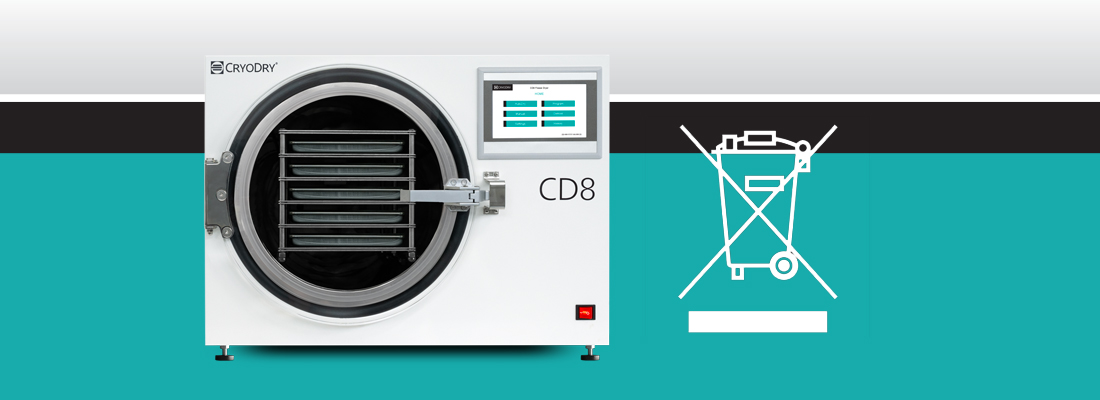Info, Knowledge Base
The Importance of WEEE Compliance for Sustainability and Environment when Purchasing a Freeze Dryer

The Waste Electrical and Electronic Equipment (WEEE) Directive is an important regulatory framework aimed at minimizing the environmental impact of electronic containing waste. As the world becomes increasingly digitized, the volume of electronic waste continues to grow, making WEEE compliance essential for ensuring sustainability and safeguarding the environment.
Our CD8 Freeze Dryer is WEEE compliant and has been designed with focus on easy & fast disassembly. It only takes 32 minutes for an untrained recycling operator to go

CryoDry is committed to environmental responsibility. We use natural refrigerant in our freeze dryer to minimize greenhouse warming potential and make it easy to properly recycle our products.
Why is WEEE so important when looking for a Freeze Dryer?
Here is some info on its implications for sustainability and environment:
Overview
The rapid advancement of technology and the increasing obsolescence of electronic devices have resulted in a significant rise in electronic waste (e-waste). E-waste contains hazardous materials that can pose serious risks to both human health and the environment. The WEEE Directive was established to address these challenges and promote responsible e-waste management.
Understanding WEEE Compliance
WEEE compliance encompasses various aspects of e-waste management, including collection, recycling, treatment, and recovery of materials. Organizations involved in the production, distribution, and disposal of electronic products must comply with these regulations to minimize their environmental footprint.
Importance of WEEE Compliance for Sustainability

- Resource Conservation: WEEE compliance encourages the recycling and recovery of valuable materials found in electronic devices, such as metals, plastics, and rare earth elements. This reduces the need for virgin materials and minimizes the environmental impact associated with extraction and processing.
- Reduction of Hazardous Waste: Many electronic devices contain toxic substances, such as lead, mercury, and cadmium. Compliance with WEEE regulations ensures the safe disposal of these hazardous materials, reducing the risk of soil and water contamination.
- Circular Economy: WEEE compliance supports the transition to a circular economy by promoting the reuse and recycling of electronic products. This approach not only conserves resources but also reduces the overall production of e-waste.
Environmental Benefits of WEEE Compliance
- Lower Carbon Footprint: Recycling electronic waste can significantly decrease greenhouse gas emissions compared to producing new products from raw materials. WEEE compliance contributes to climate change mitigation efforts.
- Ecosystem Protection: Proper disposal and recycling of e-waste prevent harmful chemicals from leaching into the environment, protecting ecosystems and biodiversity.
WEEE compliance is not only a regulatory obligation, it is a vital component of sustainability and environmental stewardship.
References
- WEEE Directive – European Commission
- Global E-waste Monitor 2020
- World Health Organization – Electronic Waste

